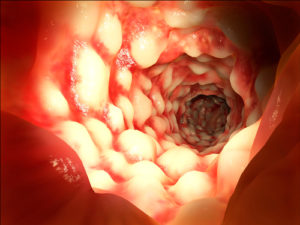 Crohn’s Disease is an inflammatory disease that affects 1.4 million Americans, approximately 20% of which are pediatric patients. This disease is a problem that can affect any part of the digestive tract.
Crohn’s Disease is an inflammatory disease that affects 1.4 million Americans, approximately 20% of which are pediatric patients. This disease is a problem that can affect any part of the digestive tract.
Explained simply, this is an inappropriate inflammatory process. For example, when a patient has an infection, it’s appropriate to exhibit inflammation, as the purpose of inflammation is to kill bacteria.
However, when there is no bacteria or bacteria present, there’s no need for the inflammation. Uncontrollable regulation of inflammation and overreaction of the immune  system primarily affects the colon and small intestines, and, in some patients, the stomach and upper intestinal tract. Symptoms may include abdominal pain, diarrhea, bleeding, nausea, vomiting, and weight loss,
system primarily affects the colon and small intestines, and, in some patients, the stomach and upper intestinal tract. Symptoms may include abdominal pain, diarrhea, bleeding, nausea, vomiting, and weight loss,
Up until very recently, Crohn’s Disease was primarily treated with medicine. Check back next week to learn about the more recent updates in treatment for this disease.





Leave A Comment